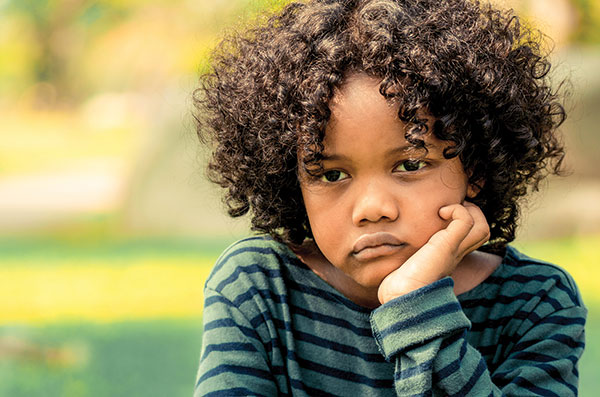Even for adults, who can fully grasp the realities of the pandemic, these long months of limited human interaction and separation from loved ones have taken their toll. What then, must our children be experiencing in a socially distanced world? Will their development be affected, and can parents do anything to lessen the impact?
HERE, TWO EXPERTS OFFER THEIR OPINIONS AND ADVICE:
 SHEDRA (MONIQUE) JOHNSON, master of social work and licensed clinical social worker, is south district manager at Canopy Children’s Solutions, where she has worked for nine years as a mental health therapist and supervisor. Johnson has over 17 years’ experience working with children and families. Reach her at monique.johnson@mycanopy.org.
SHEDRA (MONIQUE) JOHNSON, master of social work and licensed clinical social worker, is south district manager at Canopy Children’s Solutions, where she has worked for nine years as a mental health therapist and supervisor. Johnson has over 17 years’ experience working with children and families. Reach her at monique.johnson@mycanopy.org.
We have now entered the second year of our “new normal.” COVID-19 surprised us all in 2020 with its savagery and indiscriminate nature. We were not prepared.
This virus has impacted all socioeconomic statuses and demographics, including our most vulnerable: children. Many parents are beginning to question how this pandemic will affect their children’s long-term development. How will it affect them mentally, physically, emotionally and socially?
First, let’s consider some of the potential implications of children not being able to engage in “normal” social interactions. For instance, many families are now engaging in either home schooling or virtual learning, limiting participation in extracurriculars or not engaging in them at all and limiting overall interaction outside of the core family unit. How have these changes affected our children? Many parents I’ve spoken to are concerned about their children being socially isolated or “bored,” having more temper tantrums and appearing sad or depressed.
These are valid concerns, but just how concerned should we be? Children learn through play and interacting with others, especially their peers. Their engagement in daily activities with other children and individuals helps them learn to see things from others’ perspectives. This all helps contribute to the overall development of well-rounded people.
As caregivers, we must take advantage of any opportunities for our children to engage socially with their peers in a safe way. This may mean scheduling supervised FaceTime sessions or engaging in touchless games like charades or noodle tag (using a foam pool noodle), playing family board games or eliciting their help with a tactile task. Be mindful to limit social media and online activities for children to prevent the development of unhealthy habits.
Children are resilient, pliable and generally remain undaunted by some of the most challenging circumstances. However, undaunted does not mean unaffected. We do not yet know the potential long-term effects of this pandemic on children’s social or emotional development. Nonetheless, we should be proactive rather than reactive and take steps to aid our children’s social development.
Please don’t hesitate to get your child help if he or she displays concerning warning signs, such as explosive anger or aggression or thoughts of self-harm or suicide. Talk with your child’s pediatrician or general practitioner. Working with your child’s school guidance counselor or psychologist also can be valuable.
 DR. TAMARA WALKER HARPER is a board-certified pediatrician and fellow of the American Academy of Pediatrics. She is affiliated with Singing River Pediatrics – Gulfport and can be reached at (228) 328.1401.
DR. TAMARA WALKER HARPER is a board-certified pediatrician and fellow of the American Academy of Pediatrics. She is affiliated with Singing River Pediatrics – Gulfport and can be reached at (228) 328.1401.
In response to the COVID-19 pandemic, children have faced mandatory social isolation since March 2020. While no one is certain of the long-term impact this isolation will have on our children, we definitely are facing more mental health challenges in children of all ages, as young children are learning the basics of being social beings while older children and adolescents are learning to navigate complex social groups of peers. So, while social distancing and isolation have affected children of all ages, they definitely have been most challenging for school-aged children, with those in late childhood and adolescence experiencing depression and anxiety at unprecedented rates.
With infants and toddlers, the concerns return to full family wellness. As long as families and caregivers are doing well with the impact of social distancing, the isolation poses no real developmental threats to the mental health of infants and toddlers. If parents and caregivers maintain a language-rich, stimulating and engaging home environment, there should be minimal, if any, long-term mental health and developmental impacts.
However, if struggling parents are unable to create that environment, there may be impacts on development, particularly in language and speech development, as well as the development of personal social skills.
With older children and adolescents, many more factors can affect or influence their physical and mental health during the stress inherent in a pandemic, such as isolation itself, school shutdown or variations in the school schedule, reduced social life and physical activities, routine changes, sleep disturbances, exposure to disharmony at home, excessive screen use and an unhealthy diet to name a few. Prior to the pandemic, it was reported that more than one in 10 adolescents ages 12 to 17 suffered from depression and/or anxiety. During the pandemic, this rate has reached an unprecedented high, with those with pre-existing mental or behavioral health problems definitely being at highest risk.
Giving children and adolescents a sense of normalcy during this pandemic should be a priority. Family time is a great offset to isolation and loneliness. One of the most important things you can do is make time every day for your children to play, as the benefits of regular play are well documented in research. Take play time seriously and show your children you value it, as play time has been proven to increase children’s language skills, peer relations and social and physical development. Try to find fun outdoor exploratory activities for your children while maintaining social distancing. Encourage children to actively engage with friends by playing interactive games when using digital devices, remaining mindful to set clear guidelines.
Above all, the best way to ensure that children grow up healthy and happy is to be a good adult role model, as children often mimic their parents.


